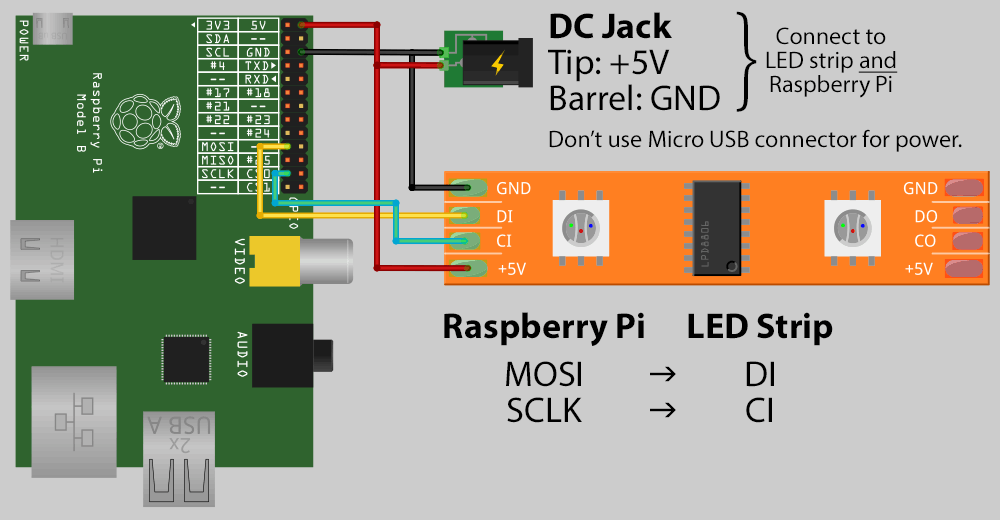Read the statement by Michael Teeuw here.
PIR sensor to turn on LED strip
-
@Egnos ok got it.
what I was saying is that the
MMM-PIR-???
modules, if you use them, THEY send the USER_PRESENCE notification
the GPIO_Notifcations module is more generic and can send notifications for ANY gpio device
-
@sdetweil said in PIR sensor to turn on LED strip:
@Egnos ok got it.
what I was saying is that the
MMM-PIR-???
modules, if you use them, THEY send the USER_PRESENCE notification
the GPIO_Notifcations module is more generic and can send notifications for ANY gpio deviceOk ok, I just wanted to be sure that, in my case, the MMM-GPIO-Notifications module sends the “USER_PRESENCE” notification.
I knew that the module I am using is a collector of GPIO devices…Thanks @sdetweil
-
@Egnos Just in case…
Im using ioBroker @home (thats a free Smart Home Software). WIth that i also have installed MQTT. Any other Smart Home software like Home Assist can do the same.
I also installed Hyperion on the same Raspyberry i have installed MagicMirror. Inside ioBroker iam using the Hyperion adapter.
So with any “user_presence” i get the MQTT informartion… and that triggers a scipt inside ioBroker to activate Hyperion.If your using any smart home software as well… this should be an easy thing. Feel free to ask…
-
@OberfragGER thanks for the valuable advice and for your availability, now I’ll read something.
In the meantime, can you tell me an LED strip (not necessarily RGB …) that is compatible with this project?
Thank you all.
-
@Egnos I have to add… i use also the Module https://github.com/olexs/MMM-UserPresenceToMQTT
For the LED-Strip… i use a WS2812. Its adessable an u can use it with 5V and it preconfigured in Hyperion.
-
@OberfragGER said in PIR sensor to turn on LED strip:
For the LED-Strip… i use a WS2812. Its adessable an u can use it with 5V and it preconfigured in Hyperion
Where did you buy the LED strip? They seem very expensive …
I have seen the connection between RPI and LED strip but I do not understand why the external 5V power supply must also be connected to the RPI, is it not enough to connect it to the LED strip?
If I really have to connect the power supply to the RPI as well, how do you do if you have both PINs of the 5V GPIO occupied?
-
I found these https://a.aliexpress.com/_EwF3KTV.
The WS2813 strip is 5V.
Can be fine? -
@Egnos - Those look like they’ll do the job.
I have seen the connection between RPI and LED strip but I do not understand why the external 5V power supply must also be connected to the RPI, is it not enough to connect it to the LED strip?
The reason is that the output of the RPi can drive a handful of LEDs, but the Pi only has so much power flowing through it (specs say 50mA). Powering the LEDs separately will let the Pi handle the logic and the power supply handle the… well, power.
-
@bhepler said in PIR sensor to turn on LED strip:
The reason is that the output of the RPi can drive a handful of LEDs, but the Pi only has so much power flowing through it (specs say 50mA). Powering the LEDs separately will let the Pi handle the logic and the power supply handle the… well, power.
Thanks @bhepler I understood that the LEDs must be powered by an external 5V because the RPI generates a few mA and is not able to turn on an LED strip, but from the photo you can see that the external 5V (+ and -) also goes in parallel on the 5V in exit from the RPI.

For what reason?
Is this connection necessary (I no longer have 5V available on GPIO …)?Thank you very much
-
@Egnos Hi, as the picture says they use the 5V power source of the led strip to power the Pi, too.
Instead of powering the pi via USB they use the 5V GPIO pin.
If you want to power the Pi via USB instead be sure to connect the Ground of the strip with ground of the pi.
